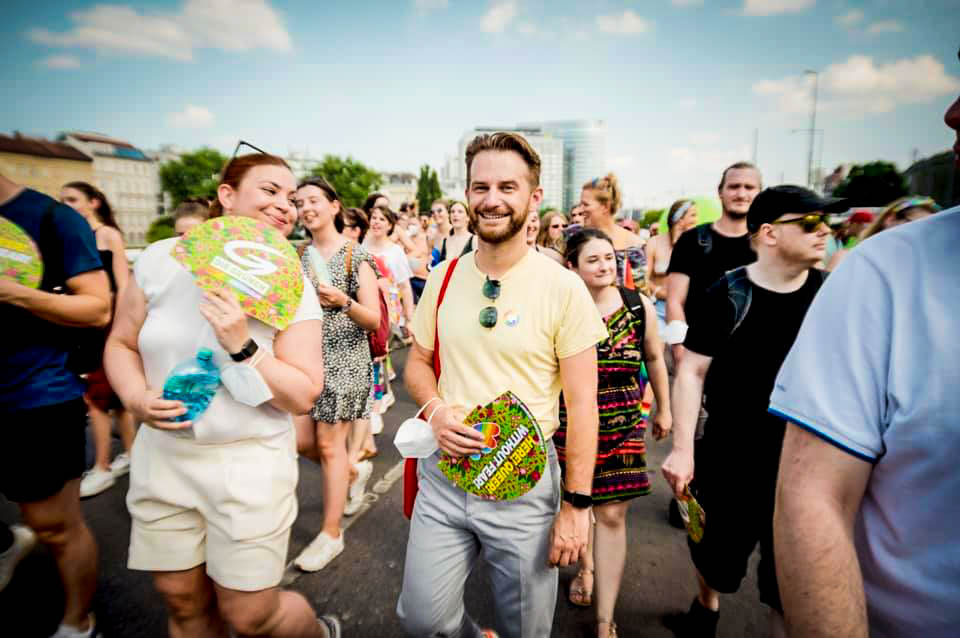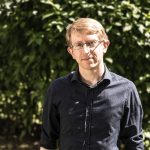As a City Council Member for the Green Party, Peter Kraus makes waves in the Austrian capital Vienna with his persistent campaigning for climate-friendly, people-focussed policy. At just 34, he is already a non-executive city councillor and a member of the Viennese state government. As an Urban Future 2020 Young Leader, we caught up with Peter to learn about his journey into urbanism and his secret to creating political change.
Bright Lights, Big Ambitions – Sparking Enthusiasm for Urbanism
To see Peter at work today, you’d be forgiven for thinking that city runs through his veins. It wasn’t always this way. “I grew up in a very small village”, he tells us. The experience of moving to Vienna to study at 18, as a young gay man, was incredibly freeing.
As a resident in a village, Peter says, you know more people than you don’t know; in cities, it’s the opposite. There was “so much more to discover: in people, in mindsets, in way of life… the whole spectrum”. This freedom, anonymity, and diversity “is the reason why the life in cities is good.” But if it was “literally feeling the urban lifestyle” that “sparked this involvement and also this fascination with urbanism”, it would be a political turn that galvanised it.
Finding a Voice
“I lived in one of the poorest districts of Vienna.” Even today the 20th district is the location of some questionable development and poorly planned use of public spaces, transport systems, and traffic policy. Gentrification is exacerbating the social divide. When it comes to development, Peter saw that “the city centre always has the cherry-picking and not the poorer districts”. It would remain this way unless someone did something. So, he did.
Peter went to the Green Party office to ask why they weren’t doing more, and he stayed. Fast-forward a couple of years, Peter met Maria Vassilakou, who would go on to become the city’s vice mayor. “I worked for her for five years. This is where I learned most of my political experience for urban planning”, alongside studying the economics of cities.
Now, elected to the state government, Peter can enact change. He has a voice in every vote but as a non-executive member, he’s completely unheeded in pursuing his passions – and those of the citizens he represents.
Climate Politics
A self-proclaimed “climate city councillor”, Peter’s people-focussed approach to everything he does is clear. He talks to other Green districts, and “colleagues from all the other parties, whether we are in a coalition or not”. He deems cooperation as of utmost importance to creating change.
“The public usually thinks of non-executive city councillors as useless because they just get money, and they don’t have an executive administrative group behind them.” This couldn’t be further from the truth. “I decided that climate change and climate crisis is my working topic”. Peter doesn’t back down from the challenge: “I just keep on working and everyone is quite irritated because I just keep on working.” As is so often the case, this persistence, this determination, is what gets results.
“Everyone just wants politicians to do their job. So why should I stop myself?”
As well as being a change-maker, Peter is a gatekeeper for policy that affects his city: “If there are bad ideas, I’m in opposition. If they’re good ideas, I support them.” How refreshing that party politics can be set aside for the good of the city, citizens, and environment.
For Peter, this is because climate protection is based on fact and urgency: “We don’t need to discuss whether climate change is real, whether more heatwaves in cities is real or not. These are scientific facts, this is consensus. I think this needs to be the basis for every political discussion and not the topic of a political discussion.”
Cities of Choice
Vienna has long been Peter’s home. Other than a 2-month stint in the Hague, the Netherlands, Peter hasn’t lived anywhere else since leaving Ternitz. And for good reason. “When it comes to quality of life and the easiness of accessing a city at the cost of living, Vienna is the place to be.”
But the Hague did influence his approach to politics.
“I think what Vienna is really missing is a positive relationship to water. The Netherlands has water everywhere, it’s an essential part of every city.” This rubbed off on the young politician, who learned that “water in cities is a very, very central angle or agenda to look at” in “adapting to the climate crisis”. Considering the world-famous Danube flows through the city, it’s surprising “Vienna has no history at all when it comes to water”.
Peter is convinced this can change. It’s already beginning. Recently, in a small street close to the main shopping district, new trees and places to sit and relax, small fountains, and a Rinnsal – essentially a small stream – were unveiled. A triumph for a district governed by the Greens, and a benefit to all.
Soft Skills for a Hard Job
“I think the most important skill in politics is listening.” Peter believes this is absolutely pivotal in bringing sustainability and equity to our cities.
His advice? Engage local people at a city level. “Citizens know exactly what they want, and they know exactly what the problems are.” From public spaces to quality of life, a politician who wants to work on sustainability must hear what the people have to say.
Don’t forget the experts, Peter points out. Globally, they’re making such advances in urban and traffic planning, and climate budgeting; if shared, this can help cities in all regions.
“If politics would just start a little bit more to learn from cities and to listen to experts and to citizens, I think the quality of politics would improve a lot, really a lot.”
Grandma Knows Best
We asked Peter for the best advice he’s ever been given. “My grandma always told me (in German) you don’t need to take every card.” It’s a clear analogy. A good card player picks their hand wisely. Peter sees this in politics as he works for change, “because it’s not easy. It’s baby steps”. Possibly the most profound part of his answer is this: “Sometimes just let it go.” Not easy to do for any of us that want to shake up the system. But Peter advises picking your fights wisely. It’s better to create change one step at a time than get nowhere with everything.
The second piece of advice came from an ex-colleague from the Green’s communications department who told him to just “go out and meet strangers”. It’s a good way to stay grounded in what you’re working towards.
Peter took this to heart, and it now defines his approach to politics:
“This is kind of my motto. You know, when you’re spending too much time at the office, when you’re spending too much time with people you see every day, it gets very tight in your head and then you need to go out and meet strangers because it opens up your mind.”

Urban Change is Still Exciting
It took two years of “political fight” to transform Mariahilfer Straße in central Vienna from a car-infested main street into an accessible and pleasant pedestrian zone. Now “it’s just packed! It works. It works for businesses, it works for the people living there, it works for the visitors, for the tourists, for everyone.”
But for Peter, it’s so much more. For the village boy who arrived in the big city, it’s personal. Peter has made his mark on the city he loves for the benefit of the people he cares about. The buzz he gets from it is palpable in our conversation.
“Whenever I go there, my heart starts beating a little faster, because I think this is real change that changed the everyday life of so many people, people working there, people going there for a run, it really changed everyday life.”
Carrying On That Momentum
“I think cities are the places where most part of our futures will be decided when it comes to sustainability, but also when it comes to an open-minded way of life and social movements that are nurtured in cities.”
By 2030, Peter envisages a lot changing in politics, with sustainability leading the charge. Top of the agenda will be decisions around how we use and interact with our cities, planning public spaces, and getting around. And the prediction is a far cry from the image of the 20th-century cities build for cars “where it’s loud, and it stinks”. Right now, Peter says, we’re on the precipice, a turning point when cities are becoming “attractive places you want to go, you want to spend your free time there. And I think this transformation is very exciting”.
The Drive to Keep Going
Given the relentless mission to decarbonise cities at speed, isn’t it hard to keep the enthusiasm up? Not for Peter. During the COVID lockdown, Peter missed the ongoing engagement with citizens. The direct exchange, seeing what matters to them, spurs him on.
This materialised in summer 2021, when gatherings were once again allowed. Peter joined the crowds protesting to convert a 12,000 square feet parking space at “the Naschmarkt, which is a big heat island within the city” into a park: “I felt like what it is when people, citizens, start organising themselves and are looking for someone in politics to discuss their agenda or their projects”. As the people who elected him, Peter feeds off their energy and finds the motivation to “work for their interests, for their projects, for their quality of life”. Because their hopes for the city are his own.
And when change becomes a challenge for anyone on the political stage, Peter wants you to remember why it’s important to carry on, and what it can achieve: “You’re not doing politics in the empty space. Politics means really very concrete change in everyday life.”


